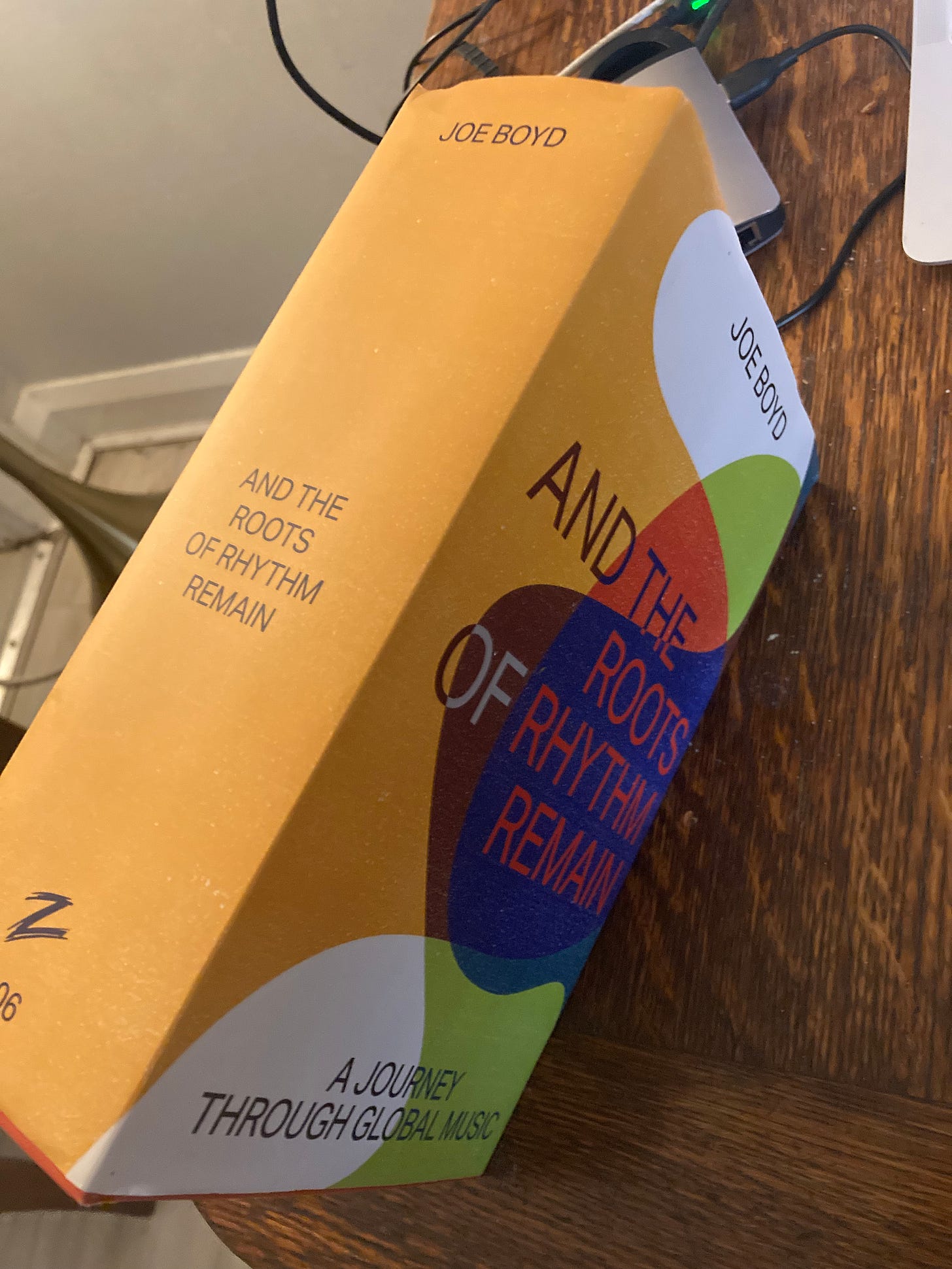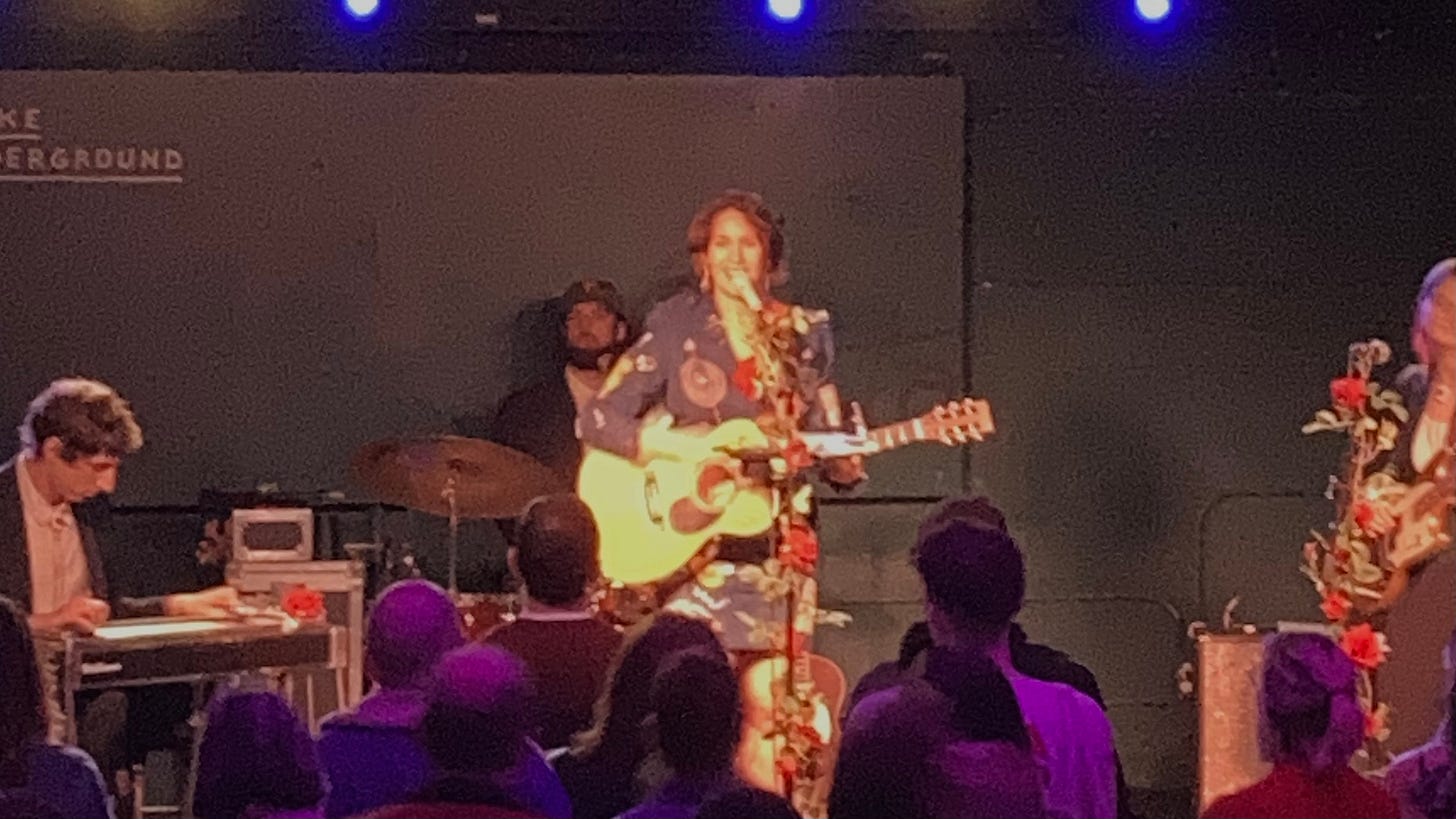Joe Boyd, And the Roots of Rhythm Remain, in Toronto on Sunday (April 13)
Joe Boyd’s track record is frankly insane. The night Dylan “went electric” at Newport? That was Boyd on the sound board. The swinging-London “psychedelic ballroom” UFO where the early Pink Floyd went on interstellar trips? Boyd co-owned it. (He also produced their first single, “Arnold Layne.”) He produced Fairport Convention, Richard & Linda Thompson, Sandy Denny, and those Nick Drake albums you like so much. He oversaw the soundtracks of Deliverance and Clockwork Orange. In Canada, he produced the first Kate & Anna McGarrigle albums, and later had a hand in Mary Margaret O’Hara’s Miss America, but bailed. (We might need to ask him about that one.) It goes on. But more relevant to the topic at hand, he also produced Mali’s Toumani Diabaté and the genius Hungarian ensemble Muzsikás for his Hannibal Records label—and if his new book is to be believed, Paul Simon tested out the concept for Graceland by playing the South African background tapes and singing the lyrics over them in Boyd’s ear.
Boyd’s new book And the Roots of Rhythm Remain takes its title from one of those Simon lyrics, and the intricacies of the musical and apartheid-era politics of that album provide the jumping-off point for its opening chapter delving deep into South African music. But its scope is much more expansive: Its Journey through Global Music, as the subtitle puts it, crosses many continents and some 900 pages. Boyd argues, for instance, that how American and Cuban slaveholders treated enslaved Africans’ drums (allowed in Cuba, banned in much of the U.S.) determined how those countries’ musics diverged, though later to cross again. In another chapter, he traces the South Asian influence carried by the Roma people through the trade routes of Asia and Europe (a la that beautiful film Latcho Drom), as well as hippiedom’s embrace of Indian music, and more. Other chapters cover Brazil, Argentina, Jamaica, the Balkans & Russia, and another set of African nations that includes Mali, Nigeria, and Ethiopia.
I haven’t had a chance to peruse the whole enormous bulk. But it’s clearly an autodidactic odyssey, opinionated and stuffed with stories and ideas, though unrigorous by ethnomusicological standards. No doubt experts would have misgivings. For the lay reader it’s a much more lively journey than any textbook’s, with the added bonus of the author occasionally popping up as a player in events. On the other hand, the 82-year-old’s suspicion of the contact between traditions and technology means genres like dancehall, reggaeton, and contemporary Afrobeats, e.g., don’t get much of a look. It needs the counterweight of a (much thinner) book like Jace Clayton’s Uproot, about all the music in Asia and Africa being created on phones and Playstations and Auto-Tune.
Nonetheless Boyd is a living archive, and a celebrated raconteur. Anyone in Toronto with the time to spare should squeeze into the Rivoli on Sunday afternoon to hear him. (Or keep an eye out for a visit nearer you.)
Me elsewhere
This week in the online magazine Arcade, I have an essay riffing off the TV show Severance to talk about doppleganger stories, the myth of the unified self, affairs, polyamory, addiction, and more, plus this song by the Beths, “Future Me Hates Me.”
Also this week, I was on the Slate Culture Gabfest talking about Lucy Dacus’s Forever is a Feeling. See here or in your podcast beacon of choice.
Mekons, Horror (Fire Records)
“Were we ever happy, or were we never happy?” asks Sally Timms on “A Horse Has Escaped” from the Mekons’ Horror.1 It’s a question that at least puts the current klaxon of panic in some quizzical perspective, as one might wish from a band that’s existed in one form or another for a half-century. (Their 50th anniversary is next year.) In fact, the Leeds-born UK anarcho-punk collective’s latest album, their two-dozenth-ish, begins with a history lesson in “The Western Design”: “In 1654 on Christmas day, the fleet left Portsmouth/ The British Empire, taking off … The Western design, a giant Frankenstein.” But there is no removed academic placidity here. As the title signals, Horror is full of more urgency and anger than perhaps anything else the Mekons have done in the 21st century. There’s a lot less affable winking, a more concentrated sense of reckoning. I’ve been excited since songs started coming out one by one late last year, and the whole fulfills those portents.
The album sounds like the present, even though the main material is from 2022, when (as is their practice of many years now) the eight members found a rare chance to gather from their disparate home bases around the world to write and record more or less from scratch. This time they were in Valencia, Spain, where once “General Franco drove democracy into the sea and somehow it was agreed that the horror must never be mentioned again.” But its mood and energy also recalls the band’s mid-to-late-1980s, anti-Thatcherite peak on albums like The Edge of the World and Rock’n’Roll, what you might call “classic Mekons” if there is such a thing. (For their full story seek out the 2013 documentary The Revenge of the Mekons on your streamer of choice.)
While I usually gravitate to Timms and Jon Langford’s songs most, it’s Tom Greenlagh’s scratchy drawl that feels the loudest clarion here, on that opening track and on songs like “War Economy” (“We did not invite you/ You do not know us/ Nor do you know our world/ You have no right to rule us,” he snarls, while Langford hollers the title phrase in the background) or the lightly psychedelic “Private Defense Contractor” (“In my fantasy world, the owl has flown/ Cryptic signs say crawl under the throne”). Still, Timms’ cuttingly crystalline tones are heard too infrequently until the second half of the record, except dueting with Langford on the perhaps literally ghostly second track, “Sad and Sad and Sad”: “A whisper comes from the living world/ Not much, but it will do… And there is a lack of tomorrows.”
That song is a woozy waltz, one of the many Mekons specialities lit upon here, from the folk-meets-dub of “The Western Design” and “Surrender” through the Blondie-ish (RIP Clem Burke) disco-rock of “Glasgow,” Rico Bell’s Poguesy Celtic climate lament “Fallen Leaves,” the ’80s college-rock of “Mudcrawlers,” the pre-war parlor-song “Sanctuary” (a little like a Magnetic Fields excursion), Langford’s anthemic “You’re Not Singing Anymore” (a wry title for the album’s most likely singalong), and finally Timms closing out the trip on the eerie, half-spoken “Before the Ice Age”:
My surplus value stolen by a Victorian vampire sucking out my cold cold heart,
The walls of my self are crashing quietly in the transistor dark,
Slimy fingers on the glass touch screen …
My data stripped and whipped and sold in chains by officious machines
… In between the blows of the policeman’s truncheon, cold, blue, and long,
I go back to sleep, I go back to sleep...
Every Mekons album is worth hearing, but this one is going to be in heavy rotation for a long while as its mysteries continue to sink into me. (If only their tour this summer were coming to Toronto!)
Lola Kirke at the Drake Underground, April 10/25
Finally, last night I had the pleasure to see Nashville (via New York and London) artist Lola Kirke in the Drake basement, on tour supporting her new album Trailblazer as well as her memoir Wild West Village. It got off to a somewhat bumpy start with a “surprise” mini-set of, I will just say, dubious country cosplay by locals July Talk, who apparently befriended Kirke on tour. It was a coy move, but that it fell so flat (at least to me as a non-July Talk devotee and a slightly prickly country defender) was perhaps not entirely their fault—the sound was an issue all night, mostly muffled and punchless; it improved only by the final third of Kirke’s set.
Despite all that, and running on no sleep with a hoarse throat, Kirke powered through on endless charm and some damn fine songs.
As the memoir details, she’s a showbiz semi-bohemian New York/London brat who tried acting with some success (like her older sister Jemima) before going country. But the songs about her family on the album (“Zeppelin III” about dad, “Marlboro Lites and Madonna” for mom) put a lot more heart and ache on that scenario than nepo-baby stereotypes suggest. (They’re almost like a country take on McGarrigle-Wainwright clan-drama songs.) Her tight Nashville-cat trio on bass and drums and pedal steel (whose names I failed to note, sorry), not to mention her perfectly tailored Nudie-suit-styled dress, cinched the argument for her successful transplantation—on the hipster side of Nashvegas, but not in a downbeat, no-dancing sense.
Enormous extra credit is due, in fact, for the segment in which Kirke patiently taught the full house a multi-part line dance, going over it enough times to make sure we really got it before going into the song proper. It led to the miraculous sight of Toronto wipipo gamely, physically participating in synchronized activity, right here in the screwface capital. A beautiful thing. And then in the encore she covered both Paula Cole’s “Where Have All the Cowboys Gone” and the Yeah Yeah Yeahs’ “Maps” (better known now as a source for Beyoncé’s “Hold Up”).
Very much want to see Kirke back soon, in a venue that will repay more equally the umph she brings.
For a treat
If, like me, you are a devotee of either or, better, both Rickie Lee Jones and Neko Case—not only as standout singer-songwriters of two generations but more recently both as extraordinary memoirists—you will revel as I did in last weekend’s Substack video chat, which I think was the pair’s first-ever conversation. It’s a ramshackle affair, but reader, I swooned.
A song that reminds me of the signature joke-metaphor of the first T***p administration, John Mulaney’s “There’s a horse loose in the hospital.”







God bless the Mekons.
Thanks for the tip regarding Jace Clayton's Uproot. Sounds like a fascinating read!